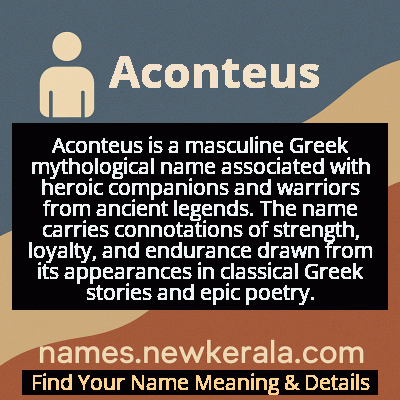Aconteus Name Meaning & Details
Origin, Popularity, Numerology Analysis & Name Meaning of Aconteus
Discover the origin, meaning, and cultural significance of the name ACONTEUS. Delve into its historical roots and explore the lasting impact it has had on communities and traditions.
Name
Aconteus
Gender
Male
Origin
Greek
Lucky Number
8
Meaning of the Name - Aconteus
Aconteus is a masculine Greek mythological name associated with heroic companions and warriors from ancient legends. The name carries connotations of strength, loyalty, and endurance drawn from its appearances in classical Greek stories and epic poetry.
Aconteus - Complete Numerology Analysis
Your Numerology Number
Based on Pythagorean Numerology System
Ruling Planet
Saturn
Positive Nature
Ambitious, efficient, realistic, and authoritative.
Negative Traits
Materialistic, stressed, confrontational, and can be overly ambitious.
Lucky Colours
Dark blue, black.
Lucky Days
Saturday.
Lucky Stones
Blue sapphire, amethyst.
Harmony Numbers
2, 4, 6.
Best Suited Professions
Business leaders, managers, financial services, law enforcement.
What People Like About You
Leadership, determination, organizational skills.
Famous People Named Aconteus
Aconteus
Mythological Warrior
Participant in the Calydonian Boar Hunt, celebrated for bravery
Aconteus
Mythological Companion
Turned to stone while gazing upon Medusa's head alongside Perseus
Aconteus
Mythological Figure
Featured in multiple Greek heroic narratives and epic poems
Name Variations & International Equivalents
Click on blue names to explore their detailed meanings. Gray names with will be available soon.
Cultural & Historical Significance
Beyond individual myths, Aconteus represents the broader cultural tradition of naming practices in ancient Greece, where names often carried specific meanings and mythological associations. The persistence of such names in classical literature demonstrates their importance in preserving cultural memory and heroic ideals. As a relatively minor but recurring mythological figure, Aconteus embodies the Greek concept that heroism exists not only in famous leaders but also in loyal companions who contribute to collective achievements. This cultural significance has ensured the name's preservation through centuries of classical scholarship and mythological study.
Extended Personality Analysis
The personality associated with Aconteus is characterized by profound loyalty and unwavering determination, drawing directly from the mythological figure's role as a steadfast companion in heroic quests. Individuals with this name are often perceived as reliable and courageous, with a strong sense of duty toward their chosen causes or companions. They typically exhibit leadership qualities tempered by a understanding of their place within larger collective efforts, much like the mythological Aconteus who participated in group endeavors rather than seeking individual glory.
However, the tragic element of Aconteus's mythological fate—being turned to stone—suggests potential personality challenges including stubbornness, resistance to change, or difficulty adapting to unexpected circumstances. This duality creates a complex personality profile where great strength and reliability coexist with potential inflexibility. In modern interpretation, an Aconteus might be someone who forms deep, lasting commitments but must consciously work to maintain flexibility in thinking and approach. The name suggests a personality that values tradition and established methods, yet must navigate the modern world's demand for adaptability and innovation.
Modern Usage & Popularity
In contemporary naming practices, Aconteus remains an extraordinarily rare choice, primarily confined to families with strong classical education backgrounds or particular interest in Greek mythology. The name has never achieved mainstream popularity and is absent from official baby name registries in most countries, preserving its distinctive and scholarly character. Modern usage typically occurs in academic circles, among classical studies enthusiasts, or in Greek communities maintaining traditional naming practices. The name's complexity and strong mythological associations make it more likely to be chosen deliberately for its cultural significance rather than following naming trends. Its rarity ensures that any modern Aconteus would carry a name that is both conversation-starting and deeply rooted in classical tradition, appealing to parents seeking unique names with substantial historical weight and literary pedigree.
Symbolic & Spiritual Meanings
Symbolically, Aconteus represents the complex interplay between strength and transformation, embodying both the power of steadfast commitment and the vulnerability to profound change. The mythological petrification of Aconteus serves as a powerful metaphor for how convictions and loyalties, while sources of strength, can also render one immobile when faced with overwhelming truths or circumstances. This duality makes the name symbolic of the human condition itself—our capacity for both unwavering determination and necessary adaptation. The name also carries connotations of legacy and memory, representing how individual stories become part of larger cultural narratives. In broader symbolic terms, Aconteus signifies the classical understanding that heroism involves not only action and achievement but also the acceptance of one's fate and the transformations that destiny brings, making it a name rich with philosophical and psychological resonance.

